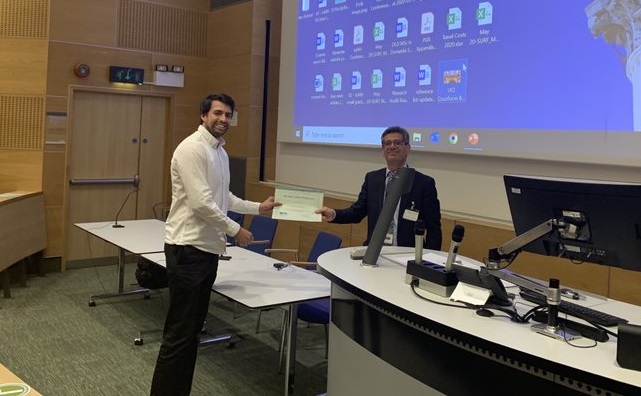The Michael King Prize winner: one year on
By iomh, on 21 June 2023
Entries are invited for the 2023 Michael King Prize, which is awarded to the UCL PhD awardee with the best thesis on a subject relating to mental health. In this blog, last year’s winner Aaron Kandola, shares his experiences of the award and reveals what he’s been doing since then.

Last year I was awarded the Michael King Prize for my PhD thesis on the relationship between physical activity, fitness, and sedentary behaviour with depression and anxiety symptoms in the population.
I showed that higher physical activity levels measured with wearable devices were associated with a lower risk of future depression and anxiety during adolescence and mid-adulthood. For example, an hour of light-intensity activity was associated with 8-16% lower depression and anxiety scores in adolescents. Light activity includes most daily activities from walking at a casual pace to house chores.
I also found that more time spent sitting each day was a consistent risk factor for depression and anxiety, independent of physical activity levels. However, different sitting-based activities may have varying effects on mental health risks. For example, playing video games were associated with fewer depressive symptoms and using social media with higher depressive symptoms in adolescents.
My research also showed the importance of physical fitness for mental health. For example, I found that low aerobic or muscular fitness were associated with 1.48 times and 1.38 times higher odds of depression and anxiety compared with high fitness in adults. Fitness could be a novel marker for mental health risks as it is increasingly becoming for chronic diseases, such as heart disease.
Since receiving the Michael King Prize, I spent some time working in the Wellcome Trust’s Mental Health Team alongside a data science position at a health technology company (juli) and a research position at the MRC Unit of Lifelong Health and Ageing at UCL.
I worked specifically in the Field Building Team at the Wellcome Trust to develop funding calls that stimulate collaboration and innovation to accelerate progress in mental health science. I left that position in late 2022 but continued my part-time positions at juli and UCL.
juli is a chronic disease management platform co-founded by one of my PhD supervisors at UCL, Dr Joseph Hayes. There I combine wearable, smartphone, and clinical data to generate insights and build machine learning models that support people with chronic conditions in various ways, such as by forecasting changes in their symptoms ahead of time.
At UCL, I use data science and epidemiolocal methods to identify and analyse risk and resilience factors for adolescent mental health in large population-based datasets . We have access to several cohort studies, which follow people throughout their lives with an array of measures and tests.
Applying advanced statistical methods to such rich data resources is a powerful approach for understanding how and why psychiatric symptoms develop. I primarily work with Professors Praveetha Patalay and Yvonne Kelly on the Digital Youth project, a UKRI-funded project to understand risk in the digital world and co-develop digital interventions that foster resilience to these mental health risks.
My PhD supervisors were Professor David Osborn (UCL), Dr Joseph Hayes (UCL), and Dr Brendon Stubbs (King’s College London). Professor Michael King supervised both David and Joseph during their PhDs and led the Division of Psychiatry for several years, where I conducted my PhD. For this reason, it was an honour to be awarded the inaugural Michael King Prize at the IoMH Annual International Conference last year.
You can find out more information about the Michael King Prize on our website. The closing date is 25 August 2023.
 Close
Close

